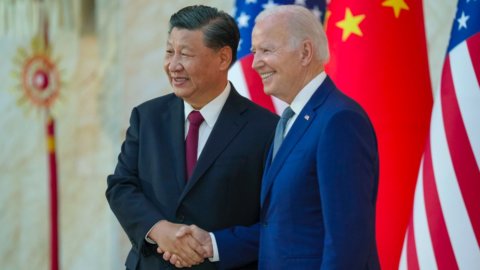Italy is a republic founded on television viewers, also because there is little work. It's a matter of timing. Of times that literally run and go away. Times that are contracting more and more, and in which what is needed is immediacy, recognisability, in a plebiscitary effect that flattens everything and in which there is no space, no longer, for complexity.
È the model of the talent show, which like an oil stain spreads to every sector of life. It's not just songs. It starts from the notation that 4 of the last 5 winners of the Festival (Emilio Marrese and Curzio Maltese talk about it in today's La Repubblica) come from X Factor, and we get to politics, passing through banks and large companies. The new cognitive model thus becomes the pitch, self-promotion, in the shortest possible time, with the greatest possible effectiveness. Under the dress nothing, or almost nothing and the dress, invariably makes the monk.
From Mengoni to Mussari, passing through Renzi. Punch the screen. At one time it would have been said of an actress. Now it's good for everyone. Above all in politics, which from the square and the club has overflowed en masse into television, in an entropic show that burns everything and in which nothing remains true forever. A swirling, omnivorous show. You always need something new, one "shock proposal" a week, if you don't want to lose your audience. The risk is that people get tired and change the channel. It's televoting, beauty, which from a television model becomes an electoral model. You give everything immediately, inside the magic box, and we, on this side of the screen, via text message or directly from the remote control, have our say, until the next episode, in a cultural void in which form rises as divinity and interim becomes the norm.
Precarious like us, politicians seek variation and consensus, a consensus which, with no more ideals and belonging, in the days when the party that would win the elections is called the "undecided", is always provisional, anchored to a promise that cannot be rejected, unless you come up with another one, different but essentially the same, immediately afterwards, leaving the viewer-voter on his sofa pressing the green button on the remote control and wondering if they'll make it this time. If we make it.
And it is thus, then, that as every time the electoral campaign is dominated by those who know this medium best (and have contributed in no small way to creating it), chased on their territory by a left too frightened by the desuetude of its cultural prerogative to really pursue it , flattening on an unconvinced egalitarianism. In the end he always remains on the scene, the only character, the one everyone talks about, who splits and divides, who loves or hates.





